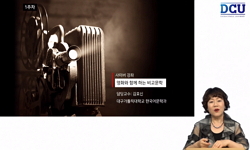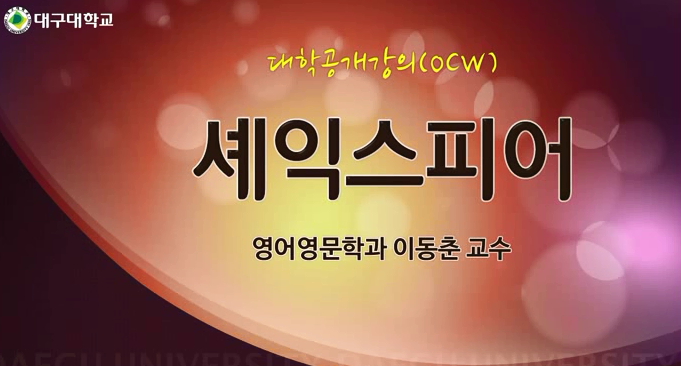The aim of this paper is to discuss the comparative method in the practical field of John Dryden’s literary criticism. John Dryden(1631-1700) is properly considered as "the father of English criticism" and "the writer who first taught us to determin...
http://chineseinput.net/에서 pinyin(병음)방식으로 중국어를 변환할 수 있습니다.
변환된 중국어를 복사하여 사용하시면 됩니다.
- 中文 을 입력하시려면 zhongwen을 입력하시고 space를누르시면됩니다.
- 北京 을 입력하시려면 beijing을 입력하시고 space를 누르시면 됩니다.
https://www.riss.kr/link?id=A104908499
-
저자
정정호 (중앙대학교)
- 발행기관
- 학술지명
- 권호사항
-
발행연도
2010
-
작성언어
Korean
-
주제어
존 드라이든 ; 경험주의 ; 문학비평 ; 비교방법 ; 초서 ; 셰익스피어 ; 존슨 ; 비교비평 ; 비교문학 ; John Dryden ; Empiricism ; Literary Criticism ; Comparative method ; Chaucer ; Shakespeare ; Jonson ; Comparative Criticism ; Comparative Literature ; John Dryden ; Empiricism ; Literary Criticism ; Comparative method ; Chaucer ; Shakespeare ; Jonson ; Comparative Criticism ; Comparative Literature
-
등재정보
KCI등재
-
자료형태
학술저널
- 발행기관 URL
-
수록면
271-299(29쪽)
-
KCI 피인용횟수
2
- 제공처
-
0
상세조회 -
0
다운로드
부가정보
다국어 초록 (Multilingual Abstract)
The aim of this paper is to discuss the comparative method in the practical field of John Dryden’s literary criticism. John Dryden(1631-1700) is properly considered as "the father of English criticism" and "the writer who first taught us to determine upon principles the merit of composition" by another great literary critic, Samuel Johnson in the Eighteenth century. Dryden was truly a man of letters in the latter part of the Seventeenth century England:a poet, playwright, critic, and translator. He wrote various kinds of writings in the great tradition of English Empiricism. He was a so-called poet-critic who was not a purely literary critic but an utterly practical critic. He wrote his literary criticism only on the basis of his various experiences as a writer in general. He was never a theoretical or speculative critic, compared with the prescriptive French critics in the age of Neoclassicism in Europe.
Dryden deals with his literary discourse by comparing Greek and Roman writers with Italian, French and English poets. Dryden’s comparative method enhances awareness of difference, from country to country and age to age. Dryden tries to establish the proper identity of English literature in the whole history of European literature from the Greek period to his contemporary period. His method of comparison in his literary criticism hada strong influence on the later English literary critics such Samuel Johnson and T. S. Eliot. Dryden set up the great tradition of comparative method in the history of English literary criticism. Now our era is the age of glocalism and cosmopolitanism, when the ethics of comparison is badly needed. The comparative method in literary criticism could be the comparative criticism in the widest sense of comparative literature. It is the very great legacy of John Dryden’s criticism for the 21st century.
다국어 초록 (Multilingual Abstract)
The aim of this paper is to discuss the comparative method in the practical field of John Dryden’s literary criticism. John Dryden(1631-1700) is properly considered as "the father of English criticism" and "the writer who first taught us to determin...
The aim of this paper is to discuss the comparative method in the practical field of John Dryden’s literary criticism. John Dryden(1631-1700) is properly considered as "the father of English criticism" and "the writer who first taught us to determine upon principles the merit of composition" by another great literary critic, Samuel Johnson in the Eighteenth century. Dryden was truly a man of letters in the latter part of the Seventeenth century England:a poet, playwright, critic, and translator. He wrote various kinds of writings in the great tradition of English Empiricism. He was a so-called poet-critic who was not a purely literary critic but an utterly practical critic. He wrote his literary criticism only on the basis of his various experiences as a writer in general. He was never a theoretical or speculative critic, compared with the prescriptive French critics in the age of Neoclassicism in Europe.
Dryden deals with his literary discourse by comparing Greek and Roman writers with Italian, French and English poets. Dryden’s comparative method enhances awareness of difference, from country to country and age to age. Dryden tries to establish the proper identity of English literature in the whole history of European literature from the Greek period to his contemporary period. His method of comparison in his literary criticism hada strong influence on the later English literary critics such Samuel Johnson and T. S. Eliot. Dryden set up the great tradition of comparative method in the history of English literary criticism. Now our era is the age of glocalism and cosmopolitanism, when the ethics of comparison is badly needed. The comparative method in literary criticism could be the comparative criticism in the widest sense of comparative literature. It is the very great legacy of John Dryden’s criticism for the 21st century.
참고문헌 (Reference)
1 정정호, "영미문학비평의 대화적 상상력" 서진북스 2005
2 박지향, "영국사-보수와 개혁의 드라마" 까치 2007
3 Wellek. René, "문학의 이론" 을유문화사 1982
4 이상섭, "르네상스와 신고전주의 비평 1530-1800" 민음사 1985
5 Eliot, T. S, "The Use of Poetry and the Use of Criticism: Studies in the Relation of Criticism to Poetry in England" Faber 1964
6 Eliot, T. S, "The Sacred Wood: Essays on Poetry and Criticism" Methuen 1960
7 Homles, Charles. S, "The Major Critics: The Development of English Literary Criticism" Alfred A. Knopf 1975
8 Watson,George, "The Literary Critics: A Study of English Descriptive Criticism" Penguin 1962
9 Aden,John M, "The Critical Opinions of the John Dryden" Vanderbilt UP 1963
10 Eliot, T. S, "Selected Essays" Faber 1972
1 정정호, "영미문학비평의 대화적 상상력" 서진북스 2005
2 박지향, "영국사-보수와 개혁의 드라마" 까치 2007
3 Wellek. René, "문학의 이론" 을유문화사 1982
4 이상섭, "르네상스와 신고전주의 비평 1530-1800" 민음사 1985
5 Eliot, T. S, "The Use of Poetry and the Use of Criticism: Studies in the Relation of Criticism to Poetry in England" Faber 1964
6 Eliot, T. S, "The Sacred Wood: Essays on Poetry and Criticism" Methuen 1960
7 Homles, Charles. S, "The Major Critics: The Development of English Literary Criticism" Alfred A. Knopf 1975
8 Watson,George, "The Literary Critics: A Study of English Descriptive Criticism" Penguin 1962
9 Aden,John M, "The Critical Opinions of the John Dryden" Vanderbilt UP 1963
10 Eliot, T. S, "Selected Essays" Faber 1972
11 Stock,R.D, "Samuel Johnson's Literary Criticism" U of Nebraska, p 1974
12 Wimsatt, William K. Jr, "Literary Criticism : A Short History.Vol.Ⅰ" U of Chicago P 1957
13 Kinsley, James, "John Dryden: Selected Criticism" Clarendon Press 1970
14 Smith,David Nichol, "John Dryden" Cambridge UP 1950
15 Manlove, Colin, "Critical Thinking: A Guide to Interpreting Literary Texts" Macmillan 1989
16 Manley, Lawrence, "Convention 1500-1750" Harvard UP 1750
17 Hall,Vernon Jr, "A Short History of Literary Criticism" New York UP 1963
18 Blamires,Harry, "A History of Literary Criticism" Macmillan 1991
19 Jensen,H.James, "A Glossary of John Dryden's Critical Terms" U of Minnesota P 1969
동일학술지(권/호) 다른 논문
-
- 한국비교문학회
- 신진범
- 2010
- KCI등재
-
모성의 광기와 딸들의 디아스포라 - 2000년대 영화와 소설 속 ‘母子 가족’ 형상화를 중심으로
- 한국비교문학회
- 오윤호
- 2010
- KCI등재
-
이상과 솔 벨로우 비교 연구 - 「날개」와 『허공에 매달린 사나이』를 중심으로
- 한국비교문학회
- 변문균
- 2010
- KCI등재
-
- 한국비교문학회
- 구광모
- 2010
- KCI등재
분석정보
인용정보 인용지수 설명보기
학술지 이력
| 연월일 | 이력구분 | 이력상세 | 등재구분 |
|---|---|---|---|
| 2026 | 평가예정 | 재인증평가 신청대상 (재인증) | |
| 2020-01-01 | 평가 | 등재학술지 유지 (재인증) |  |
| 2017-01-01 | 평가 | 등재학술지 유지 (계속평가) |  |
| 2013-01-01 | 평가 | 등재학술지 유지 (등재유지) |  |
| 2010-01-01 | 평가 | 등재학술지 유지 (등재유지) |  |
| 2008-01-01 | 평가 | 등재학술지 유지 (등재유지) |  |
| 2005-01-01 | 평가 | 등재학술지 선정 (등재후보2차) |  |
| 2004-01-01 | 평가 | 등재후보 1차 PASS (등재후보1차) |  |
| 2002-07-01 | 평가 | 등재후보학술지 선정 (신규평가) |  |
학술지 인용정보
| 기준연도 | WOS-KCI 통합IF(2년) | KCIF(2년) | KCIF(3년) |
|---|---|---|---|
| 2016 | 0.19 | 0.19 | 0.26 |
| KCIF(4년) | KCIF(5년) | 중심성지수(3년) | 즉시성지수 |
| 0.24 | 0.23 | 0.629 | 0.15 |




 KCI
KCI






